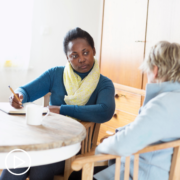360 Myeloma Care | How Can a Social Worker Help? from Patient Empowerment Network on Vimeo.
When coping with a myeloma diagnosis, how can a social worker support you in your care? Yu Mee Song provides an overview of the role of a social worker in myeloma care and discusses the importance of speaking up about emotional issues and beyond.
Yu Mee Song, LCSW, OSW-C is a Social Work Program Coordinator at the Center of Excellence for Multiple Myeloma Program at Mount Sinai Hospital. Learn more about Yu Mee Song.
See More From Thrive CAR T-Cell Therapy
Related Resources:
Transcript:
Yu Mee Song:
My name is Yu Mee Song. I am, a social work program coordinator in the Multiple Myeloma Program at Mount Sinai Hospital.
Katherine Banwell:
Excellent.
Yu Mee Song:
Thank you for having me.
Katherine Banwell:
Thank you for joining us. Can you tell us more about the role of a social worker as it relates to myeloma care?
Yu Mee Song:
First of all, I feel very, very fortunate to be working in the myeloma program amongst world-renowned myeloma specialists with a team of nurse practitioners, nurses, transplant and CAR T coordinators, patient navigators.
And our social work team is a team of five. And we can receive referrals from any of these team members at any point in a patient’s journey, from the moment of diagnosis throughout their treatment trajectory in both the inpatient and the outpatient settings for emotional needs and support to practical needs.
Katherine Banwell:
Yu Mee, when a myeloma patient comes to see you for the first time, what are some common concerns they might be having?
Yu Mee Song:
That really depends on the – on the patient and – and where they are in their life situation when they’re diagnosed. You know, if they’re working, they may have considerations about reducing work or not working or not being able to. A lot of practical concerns, maybe the first issue that they have to deal with such as transportation and getting to and from the cancer center now three times a week, or navigating the healthcare system for the first time in their life, and insurance or just coping with the fact that you’re now dealing with the diagnosis of myeloma and what does that mean and how are you adjusting to this? So, it really varies.
Katherine Banwell:
If patients are facing emotional issues, why is important for them to speak about it? And – and what support is available for them?
Yu Mee Song:
That’s – that’s a great question that I always like to stress the importance of to the patients and also the caregivers because they’re usually the ones that first notice any changes, maybe in their mood or the emotional state.
If you’re holding things in, you’re, you know, feeling like you’re alone in this fight or your fears of what might happen, that can increase your anxiety, it might lead to depression.
So, it’s really important to speak about it, ask your care team about it. It may be as simple as, you know, that’s a side effect of a medication that you’re on, and maybe we can reduce the dose or maybe we can tell you to take it at a different time of day.
And that’s so helpful to know that.
There may be help for you. You may be referred to a mental health professional, support groups, and would also improve your – your relationships within your family because obviously your emotional state it’s – it, you know, myeloma is just not impacting you but all of the loved – people around you.
Katherine Banwell:
That leads us into the next question. Some patients don’t have a partner to help them go through this – this journey with their myeloma. So, do you have any suggestions for how myeloma patients can find support and where?
Yu Mee Song:
I would say, first start with asking your care team or ask – speaking with an oncology social worker. Support doesn’t necessarily mean your – your partner. It can be in the form of support groups that are either in-person, there are many groups online.
It could be a peer – one-on-one peer support. Someone who’s gone through what you’ve gone through.










